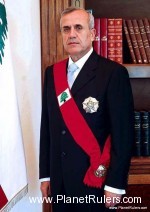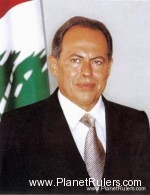His Excellency General Michel Sleiman, President of the Republic of Lebanon
General Michel Sleiman is the 12th President of the Republic of Lebanon
Born on the 21st of November 1948, in Amchit – Jbeil
Married to Mrs. Wafaa Sleiman, and has 3 children:
Rita, Dentist, married to Engineer Wissam Baroudi, and has two children;
Lara, Architect Engineer, married to Engineer Nabil Hawat;
Charbel, Medical school, 6th year.
He graduated from the Military Academy as 2nd Lieutenant in 1970, and he was appointed Commander-in-Chief of the Lebanese Army on December 21, 1998 and till May 25, 2008.
Academic qualifications
President Sleiman obtained a Bachelor of Arts in Political and Administrative Sciences from the Lebanese University in 1980. He masters the Arabic, English and French languages.
Military and Administrative courses
During his military career, President Sleiman took part in many military and administrative courses, notably in Belgium (1971), France (1981) and the Unites States of America (1995).
Decorations and Medals
President Sleiman was rewarded with many national and international decorations and medals, the most recent being the National Order of the Cedar (Grand Cordon), the Lebanese Order of Merit (Extraordinary Grade), the Medal of King Abdul Aziz, the Italian Order of Merit (Grand Cross), and the Collar of Moubarak the Great, the Khalifite Collar and the Zayed Order.
Landmarks of his military career, in particular during his Command of the Army
To dedicate the Army to defending democracy (2005-2008), rather than belonging to the regime and repressing its policy opponents. The national army henceforth preserved the citizen’s security and rights. This national role was reflected in ensuring the security of demonstrators, public and private institutions and freedom of expression starting the year 2005 (date of the assassination of Prime Minister Rafic Hariri) and to the date of his presidential election.
To fight terrorism by all military, political and social means.
To complete the deployment process of the Lebanese Army on all the Lebanese territories following the withdrawal of the Syrian Army on April 26, 2005 and till his presidential election.
To implement a plan putting an end to the Israeli war on Lebanon in 2006, and in particular, to plan and prepare for the deployment of the Lebanese Army in the South and on the land and sea passageways. The operation was carried out accurately and perfectly, and in the end, the Lebanese flag was hoisted on the Southern border hill of Labbouneh on October 2, 2006, indicating the restoration of the Lebanese sovereignty in the South.
Headlines and main activities since his election to presidency
The Nation’s deputies convened to elect General Michel Sleiman as President of the Republic of Lebanon on May 25, 2008, in a public sitting covered by local and international media, with the participation of many heads of State or their representatives, and in a climate of popular satisfaction.
The priorities of President Sleiman’s presidential term were set out clearly, notably: national reconciliation; affirming Lebanon’s active role as a message of dialogue and conviviality; protecting the country’s independence, unity and territorial integrity; providing security and favorable conditions for economic and social growth; reinforcing constitutional institutions; fighting terrorism; implementing international resolutions related to Lebanon; opposing any form of settlement for Palestinian refugees on the Lebanese territories.
President Sleiman launched the table of national dialogue at the Presidential Palace in Baabda on September 16, 2008, in pursuance of the Doha Agreement’s articles, and in view of consolidating National Reconciliation and Entente.
In parallel to local issues, he exchanged visits with heads of friendly countries, and took part in the work of regional and international organizations, especially the United Nations, in order to consecrate Lebanon’s rights and defend its supreme interests.
LINK: http://www.presidency.gov.lb
Emile Lahoud, Former President of Lebanon
| Date & Place of Birth | 1936, Baabdate – Lebanon |
| Marital Status | Married to Andree Amadouni |
| 3 Children | Kareen (1969) married to Elias Michel Murr
Emile Jr. (1975) Ralph (1977) |
| Father | General Jamil Lahoud
(one of the founding officers of the Lebanese Army) – Member of Parliament (North Metn) in 1960 and 1964 – Minister of Labor & Social Affairs in 1960 |
| Mother | Adrenee Bajakian |
| Brother | Nasri Lahoud |
| Studies | Primary : College de la Sagesse
Secondary: Brumana High School |
Military service (ranks & dates):
Promoted to General, Commander of the Armed Forces on November 28, 1989
Joined the Military Academy as Cadet Officer 1956
Promoted to :
| Ensign | 1959 |
| Lieutenant Junior Grade | 1962 |
| Lieutenant | 1968 |
| Lieutenant Commander | 1974 |
| Commander | 1976 |
| Captain | 1980 |
| Rear Admiral | 1985 |
| General, Commander of the Armed Forces | 1989 |
Academic Background:
Naval Engineering in the United Kingdom from 1958 to 1960
N.B.C. course in the U.S.A. from 1967 to 1968
Naval Staff course in the U.S.A. (Rhode Island) from 1972 to 1973
Naval Command College in the U.S.A. (Rhode Island) from 1979 to 1980
Professional Assignments:
1959-1966 : Beirut Naval Base
1966-1968 : Commander of the 2nd Fleet
1968-1970 : Commander of the 1rst Fleet
1970-1972 : Staff of the Army 4th Bureau
Assigned as Chief of Personal Staff of the General, Commander of the
Armed Forces from 1973 to 1979.
Assigned as Director of Personnel in the Army Headquarters from 1980 to 1983.
Assigned as President of the Military Office in the Ministry of Defense from 1983 to 1989.
Assigned as General, Commander of the Armed Forces from November 28, 1989.
Decorations and Medals:
Campaign Ribbon (memorial), 1961.
Lebanese Medal of Merit (3rd degree), 1971.
Medal of Merit and Honor (high ranking officer) from Haiti, 1974.
Naval Medal (excellent degree), 1974.
Romanian Medal: Tudor Vladimirescu (4th degree), 1974.
Lebanese Medal of Merit (2nd degree), 1983.
Knight of the Order of the Cedar, 1983.
Lebanese Medal of Merit (General Officer rank), 1989.
War Medal, 1991.
War Medal, 1992.
Grand Cordon of the Order of the Cedar, 1993.
Dawn of the South Medal, 1993.
National Unity Medal, 1993.
Medal of Estime, 1994.
Commandeur de la Legion d’Honneur (France), 1996.
Order of Merit of the Republic of Italy at Senior Officer Level, 1997.
Grand Cross of Argentina, 1998.



